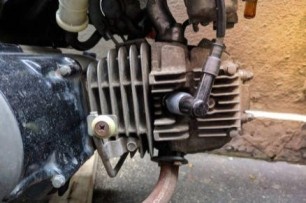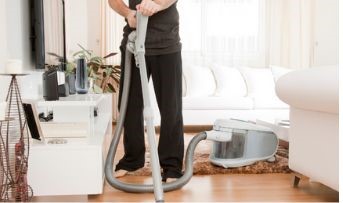General Insurance Blogs, Articles & Updates by - Magma Insurance
Have us call you
- RENEW YOUR POLICY
- BUY NEW POLICY

2-stroke or 4-stroke bike: Which is better for you
A wide range of motorcycles is available in the market today. Every model differs in several ways. So, when purchasing a bike, it is crucial to know its specific functions like its engine, mileage, and fuel economy.
Overall, a durable engine design is crucial for a good motorcycle. Even though two-wheeler engines and their mechanisms have transformed drastically over the years, the two primary gasoline-powered combustion engine designs are — 2-stroke engine and 4-stroke engine. And while you may secure your two-wheeler by purchasing reliable bike insurance, it is essential to know which kind of engine is best suited for you.
If you have done your research, you may be familiar with these two types of motorcycle engines. Although, if you're new to the field, here are some points to help you understand!
Let's understand more about a stroke engine:
To understand the functions of the engines, you must know about their combustion cycle. The engine's combustion cycle or revolution involves the piston's continuous up and down movement.
A stroke is the piston's movement from one position closest to the valve to another, which is furthest away from it. At the end of every stroke, a spark causes the gas and air mixture to ignite, which invariably helps the bike move forward.
So, what are the significant differences between a 2-stroke and a 4-stroke engine?
You may notice absolutely no difference between a 2-stroke and a 4-stroke engine on the first look. In line with its function, 2-stroke and 4-stroke bikes follow the equal gas-powered internal-combustion standards. However, the main distinction lies within the number of strokes the two engines require to produce power. A 4-stroke motorcycle needs four piston strokes to complete the combustion cycle, while a 2-stroke motorcycle does it in two.
In a 4-stroke engine, the piston performs two strokes during a single cycle, completed by a return stroke. The power gets produced after every four strokes of the piston. The highlight of this kind of engine is that it does not need to pre-mix any fluids like oil and fuel.
Similarly, in a 2-stroke engine, the combustion cycle requires just one piston compression stroke and is completed by an explosion to generate power. The power gets produced when the piston achieves two strokes. In opposition to a 4-stroke engine, a 2-stroke engine requires the oil to be pre-mixed with the fuel.
Which engine is better?
4-stroke engines are definitely the better pick. Here are a few reasons why:
1. They offer more efficient fuel consumption and controlled usage.
2. 4-stroke engines are more durable in the long term.
3. While the 2-stroke engine is more powerful, it is highly noisy and creates a loud buzzing sound that the 4-stroke one does not.
4. Above all, 4-stroke motorcycle engines are more eco-friendly. 2-stroke engines emit far more toxic emissions.
While noting all these advantages of a 4-stroke engine, you must also remember that maintaining 4-stroke two-wheelers can be more expensive. They have many intricate parts that require more intensive upkeep. Its modified efficiency requires more investment of funds from your end.
Hopefully, this article helps you understand the functions of each engine and specifically pick which type works better for you! Don't miss out on securing your motorcycle with robust bike insurance. You may visit several policy features online and purchase the one offering the best value-to-money.
Click HERE to buy the best bike insurance to protect your bike from mishaps.
Disclaimer: The information provided above is for illustrative purposes only. To get more details, please refer to policy wordings and prospectus before purchasing a policy.
A wide range of motorcycles is available in the market today. Every model differs in several ways. So, when purchasing a bike, it is crucial to know its specific functions like its engine, mileage, and fuel economy.
Overall, a durable engine design is crucial for a good motorcycle. Even though two-wheeler engines and their mechanisms have transformed drastically over the years, the two primary gasoline-powered combustion engine designs are — 2-stroke engine and 4-stroke engine. And while you may secure your two-wheeler by purchasing reliable bike insurance, it is essential to know which kind of engine is best suited for you.
If you have done your research, you may be familiar with these two types of motorcycle engines. Although, if you're new to the field, here are some points to help you understand!
Let's understand more about a stroke engine:
To understand the functions of the engines, you must know about their combustion cycle. The engine's combustion cycle or revolution involves the piston's continuous up and down movement.
A stroke is the piston's movement from one position closest to the valve to another, which is furthest away from it. At the end of every stroke, a spark causes the gas and air mixture to ignite, which invariably helps the bike move forward.
So, what are the significant differences between a 2-stroke and a 4-stroke engine?
You may notice absolutely no difference between a 2-stroke and a 4-stroke engine on the first look. In line with its function, 2-stroke and 4-stroke bikes follow the equal gas-powered internal-combustion standards. However, the main distinction lies within the number of strokes the two engines require to produce power. A 4-stroke motorcycle needs four piston strokes to complete the combustion cycle, while a 2-stroke motorcycle does it in two.
In a 4-stroke engine, the piston performs two strokes during a single cycle, completed by a return stroke. The power gets produced after every four strokes of the piston. The highlight of this kind of engine is that it does not need to pre-mix any fluids like oil and fuel.
Similarly, in a 2-stroke engine, the combustion cycle requires just one piston compression stroke and is completed by an explosion to generate power. The power gets produced when the piston achieves two strokes. In opposition to a 4-stroke engine, a 2-stroke engine requires the oil to be pre-mixed with the fuel.
Which engine is better?
4-stroke engines are definitely the better pick. Here are a few reasons why:
1. They offer more efficient fuel consumption and controlled usage.
2. 4-stroke engines are more durable in the long term.
3. While the 2-stroke engine is more powerful, it is highly noisy and creates a loud buzzing sound that the 4-stroke one does not.
4. Above all, 4-stroke motorcycle engines are more eco-friendly. 2-stroke engines emit far more toxic emissions.
While noting all these advantages of a 4-stroke engine, you must also remember that maintaining 4-stroke two-wheelers can be more expensive. They have many intricate parts that require more intensive upkeep. Its modified efficiency requires more investment of funds from your end.
Hopefully, this article helps you understand the functions of each engine and specifically pick which type works better for you! Don't miss out on securing your motorcycle with robust bike insurance. You may visit several policy features online and purchase the one offering the best value-to-money.
Click HERE to buy the best bike insurance to protect your bike from mishaps.
Disclaimer: The information provided above is for illustrative purposes only. To get more details, please refer to policy wordings and prospectus before purchasing a policy.

Here are a few reasons why your two-wheeler may be making strange noises
If you are a bike rider, you know that your bike needs to be regularly serviced to ensure a smooth and safe ride. Regular maintenance and check-up can go a long way for your two-wheeler. But, while you can grease and tighten the loose parts at home, it is better to leave the work for the experts. Today, we will look at the weird noises your two-wheeler makes and how you can identify the source of the problem.
This article will help you make an informed decision as to when to take your bike to the mechanic and when you can fix it yourself.
1. Clicking sounds:
You might have heard a periodic click from your two-wheeler on many different occasions. Although it can be a complex process to locate the exact source of the sound, you might be able to find it eventually with the help of a mechanic.
A mechanic's gadgets can be useful tools to help you find the source. A small gap, loose fittings, or a hole caused due to rusting can all be reasons for the clicking sounds.
2. Gurgling sounds:
Gurgling sounds arise when there is a problem with the cooling system. Any drop in the level of the coolant is indicative of an issue. For example, the pump cannot circulate the coolant properly if there is an air gap, and it starts to boil if it cannot move away from hot areas. This could result in the gurgle.
3. Ticking sounds:
If your bike makes a ticking sound when it reaches a particular speed, it usually indicates some damage in the valve clearance. Immediately get it inspected by a mechanic. Loose valves can affect the performance of your vehicle.
4. Whirring sounds:
Whirring sounds are invariably caused due to the drive chain. Chains generally make sounds. But if you hear anything out of the ordinary, it's time you get them checked. Cleaning your chain and examining loose rollers and stretches can help you resolve the problem.
5. Knocking sounds:
Knocking sounds are directly connected to the engine. Worn-out shells and collapsed bearings can hinder your engine's performance and be catastrophic. If you hear them while driving, you should immediately park the vehicle to safety and inspect the problem. It is also recommended to call a mechanic to fix the issue.
6. Whining sounds:
Whining sounds are clear indicators of gearbox issues. Gears work in pairs, and a problem in either reflects on the other.
7. Clattering sounds:
Clattering sounds could be indicators of issues with the chain or tensioner. Since chains undergo wear and tear over time, it leads to fatigue in the tensioner. This is not as dangerous as knocking sounds, but it can affect the bike's performance.
8. Popping sounds:
Checking the exhaust pipes for gaps or gas leakage should be the first step when you hear popping sounds.
These are the few sounds that you might have heard from a two-wheeler. After the preliminary examination, it is best to take your vehicle to a mechanic. They will be able to provide you with solutions for the same.
Sometimes you might need to change parts of your bike if the damage is severe. This can be expensive and burn a hole through your pockets. But, having your two-wheeler covered under insurance can do wonders for you. A good 2 wheeler insurance acts as a shield against such unprecedented expenses and offers several benefits that can be advantageous in case of damages.
Click HERE to look at 2 wheeler insurance options.
Disclaimer: The information provided above is for illustrative purposes only. To get more details, please refer to policy wordings and prospectus before purchasing a policy.

Spring cleaning is beneficial for your house and your health too
Most people love to clean their houses and redecorate them to give them a brand-new look. Often, professional deep cleaning is required to address those areas and corners throughout the house you overlook daily. However, it is recommended that they do so before the beginning of spring. While experts have documented the pros and cons of summer and winter cleaning, spring cleaning has no negative implications.
Not only does a round of decluttering make your house look spik and span, but it also does wonders for your physical and mental health and overall well-being! Especially when you are living with the elderly, ensuring a clean and safe indoor environment becomes more important.
Before diving into the benefits of the activity and getting started on deep cleaning your home, consider purchasing health insurance in India for parents and other family members. Health insurance in India for parents protects them from the risk of mishaps or developing any allergies by creating a safety net that shares the financial burden of hospitalisation.
With that out of the way, here are some of the benefits spring-cleaning offers.
1. Keep your mind and body physically active:
Only a few people enjoy going to the gym or a strenuous workout. However, carrying boxes of old goods and scrubbing the walls and the floor can be a real workout. Keeping your body and mind active results in a healthy heart and a happy mind. Moreover, cleaning is one of the best ways to burn some of the calories you gain during the holiday season. Plug your headphones in and play your jam and get cleaning!
2. Reduces the chance of injury:
A messy home increases the risk of injury for everyone, irrespective of age or gender. Spring cleaning gives you the time to throw out extra junk and replace old and weak items with new and stronger ones. It also allows you to notice any loose wire or floorboards that can cause severe injuries.
3. Protects the immune system:
While seasonal allergies can cause daily discomfort, mould, dust, and pet dander cause many medical problems. Therefore, deep spring cleaning helps eliminate pests and prevent respiratory problems. Dusting the furniture, windows, and other hard-to-reach places and covering them with a rug or cloth minimises the chances of dust accumulation. Deep vacuuming of carpets, curtains, and floors also prevents infections and pest problems.
Besides these, cleaning the kitchen and bathroom allows you to redecorate the place and understand the need for some particular cleaning products. Remember to avoid the overuse of sponges and dishcloths, as they get filled with bacteria over time.
4. Improves mood and focus:
A clean and fresh house improves your mood and clears your mental space. Cleaning your home is also a great way to relieve stress and anxiety, thus allowing you to focus on other aspects of your life. Clear and calm mental health leads to positivity and better productivity.
5. Prevents bugs and rodents:
Bugs and rodents love a dirty and messy home. Therefore, proper spring cleaning helps you avoid the growth and spread of bacteria and diseases caused by unwanted pests. Regularly sanitise the garbage bags below the kitchen sinks and cabinets and the area around the fridge to prevent bugs and rodents.
Cleaning your house may seem tiring and stressful, but once you start, you'll realise how much you need a clean and proper space and the therapeutic joy it offers. It also allows you to bond with your family over the seasonal cleaning. Before you start, ensure you buy health insurance in India for parents and all your dependents to protect yourself from medical emergencies.
Click HERE to buy health insurance in India for parents.
Disclaimer: The information provided above is for illustrative purposes only. To get more details, please refer to policy wordings and prospectus before purchasing a policy.

Follow these eight handy driving tips while travelling on highways
Road trips are something that all travel enthusiasts look forward to. They allow you to explore more than just your destination. From families to working professionals, road trips are perfect for every individual who wants a short and quick escape from the daily hustle of life.
While you enjoy most of the time driving on the highways with fast-paced cars passing along, there are certain things to keep in mind while navigating your way through the roads safely.
This article will look at eight handy driving tips while travelling on highways.
1. Speed control:
As opposed to city roads, on the highway, you are expected to drive faster than usual, owing to the multiple lanes and the light traffic situation. However, it is best to stick to the speed indicated by the signs on the road.
2. Lane change:
Switching lanes is one of the most overlooked driving practices. It is significantly more important on highways as most vehicles travel at higher-than-average speeds. When you change lanes, remember to turn on the car indicators to the traffic behind to signal them.
3. Analysing the distance:
While on the highway, ensure sufficient distance between your vehicle and others. Doing this gives you enough time to slow down and avoid a collision in case the driver in front brakes suddenly.
Stick to the “three-second rule”. Look for a point of reference and check the time you take to get that point after your preceding car passes it. The time taken should be at least three seconds, if not more.
4. Night driving:
Proper visibility is essential when it comes to driving at night. Keep the windshield clean and ensure that all the lights are working. The headlight should not be aimed too high because it will cause discomfort to others on the road. Try avoiding late-night trips. Instead, start early in the morning so that you manage to reach your destination during the daylight hours.
5. Breakdown:
In case of a breakdown, slow down gradually and move to either side of the highway. Turn on the hazard lights and place the hazard triangle about 10 feet behind the car to warn others. Call assistance after examining the damage. It is advisable to have contact details of highway assistance handy while taking road trips.
6. Take regular breaks:
Continuous driving for hours can be exhausting for the drivers. It is advisable to take frequent halts or refreshment breaks to relax your body and prepare to resume your journey. You can either take a quick nap or have some warm tea or coffee.
7. Servicing:
Before going on a long trip, it is recommended to take your car to the service centre. Facing issues while driving on the highway can be troublesome. Hence servicing and checkups should be a must before long trips.
8. Paperwork:
Carrying legitimate paperwork during highway journeys is essential. Make it a point to have your licence, PUC, and car insurance papers. Check the validity of all these documents to avoid getting fined and ensure that you face no legal troubles while on the road.
These are some of the top tips to keep in mind when taking a road trip. Navigating through the highway can be challenging at times. Hence, it is best to have a car insurance cover to safeguard you. With so many options to choose from, you might want to go through the new car insurance rates and choose the one that suits your needs the best.
Click HERE to know more about new car insurance rates.
Disclaimer: The information provided above is for illustrative purposes only. To get more details, please refer to policy wordings and prospectus before purchasing a policy.

Five ways to tackle dental anxiety and respond well to your treatment
Dental issues are quite prevalent these days. Our lifestyles are a significant reason behind these health troubles. The type and quality of food we consume, the dental care routine we maintain, and the products we use are vital factors that contribute to our dental health.
We all experience fear when we have to visit the dentist. And a lot of people often try to escape dental treatments despite suffering from severe tooth problems. Four out of seven people in Asia face dental anxiety. It is pretty common, but you need to take it sincerely. People with dental anxiety often try to delay their treatments, skip their appointments, try unprescribed solutions, or ignore the gravity of their troubles.
Delaying the treatments might lead you to the dentist without having any choice except to get more expensive treatments. In this article, we will discuss five effective ways to tackle dental anxiety so that you respond well to your treatment.
1. Be straightforward with your dentist:
You should disclose all the problems you feel and the symptoms you notice to your dentist. Feel comfortable telling them about your fear regarding dental examinations and procedures. Revealing your concerns will help the dentist make your appointments smooth and stress-free.
It gives the dentist freedom to lead the way around your dental check-up and tell you about the science behind your oral dilemmas and treatments to help you understand the process in a better way.
2. Have a company:
Don’t go to the dentist alone if you face dental anxiety. Instead, ask a family member or close friend to accompany you so that they can help you stay calm.
This will keep you relaxed throughout your dental appointment. They can also help you note down the intricate details regarding the treatment and medication.
3. Search for an excellent dental practitioner:
Try to find a good dentist specialising in treating people with dental anxiety/phobia. The more you trust your dentist, the smoother and more comfortable your experience will be.
You may reach your friends or relatives to find out about their dentists. It will give you a better idea (and a reference wouldn’t harm).
4. Meditation:
Your dental anxiety can get the worst of you as you are sitting in the waiting room or about to hop into the chair. Meditation can help you reduce stress and keep you calm.
Close your eyes or concentrate on any object around you and slowly let your body relax. Muscle relaxation helps in releasing stress.
5. Deep breathing:
Like meditation, breathing exercises also help you achieve the calm you require to tackle your dental anxiety. Deep breathing keeps your mind at peace and relaxes your body.
Try closing your eyes, breathing in, holding it for a few seconds, and then breathing out through your mouth. Repeat this a couple of times and relax before climbing into the chair.
Now that we’ve discussed how to tackle dental anxiety, it is wise to purchase online health insurance and get regular full-body check-ups. Getting online health insurance can help you tackle unprecedented health emergencies and safeguard you and your family from the monetary pressure of such unfortunate situations.
And check-ups can help you detect ailments in the initial stage to avoid them becoming severe. Also, adapt to good oral hygiene, a healthy diet, and regular exercises to keep yourself fit and energetic.
Click HERE to learn more about online health insurance.
Disclaimer: The information provided above is for illustrative purposes only. To get more details, please refer to policy wordings and prospectus before purchasing a policy.

Porting your health insurance policy cannot get simpler
With age, one has to adapt to the evolving environment and take on complex roles as a contributor to the growth of society, the workplace, and the family. This additional responsibility within the settings of your home usually translates into the natural reversal of roles where you begin to take charge of duties that your parents once undertook. This includes financial responsibilities such as future-proofing wealth, preparing for contingencies, and planning for your future needs.
When considering ageing parents, one of the priorities to manage is their health and well-being. Despite carefully purchasing the best health insurance in India for parents, you may find yourself in a dilemma after a short while. As their immunity weakens, they may need coverage that may require additional premium payment or porting of the policy to reap better value from a different insurer provides. However, you do not wish to lose out on the NCB and the accumulated benefits of retaining the policy.
If you are in a situation where you wish to port your policy to avail the perks of the best health insurance in India for parents, here is a simplified guide.
1. Evaluate alternatives:
It is recommended to compare and evaluate the offerings of various insurance providers before purchasing any insurance product. The same applies to finding the best health insurance in India for parents. The digital presence of most major insurers makes it easy to compare different health insurance policies online. Ensure that you check their coverage, premiums, inclusions, and exclusions to find the most compatible policy that protects against contingencies and risks.
2. Written request submission:
Once you decide to port your policy, the immediate step is to inform your present insurer of your decision. Usually, it requires 45 days for the request to get approved. Therefore, you must send in the request for porting at least 45 days in advance from the date of policy renewal.
3. Intimate the new insurer:
Once you identify and contact a new insurer that offers the best health insurance in India for parents, you will receive a portability form that requires all the details of the policy you wish to port and a proposal form.
4. Sharing of policyholder information:
This step takes place between the old and new insurers. The new insurance company requests the medical details of the insured to assess the risk of insuring your parents. Any related documentation, like claim records and personal details, may also be shared. At the same time, this information is also shared with IRDAI.
5. Risk assessment:
Upon receiving the documents, the new insurer analyses your parents’ risk profile to determine the risk involved. An underwriter or actuary usually undertakes this task.
6. Policy underwriting:
If the risk assessment results in a favourable outcome, the insurer undertakes to cover your parents. This is usually informed to the policyholder within 15 days of submitting the portability form. In case of a delay in correspondence, you are assumed to be covered by the new insurer.
7. Policy comparison:
Once framed, the proposed policy is shared with the present insurer for comparison and evaluation. The current and new insurers are responsible for ensuring that the IRDAI-issued guidelines for porting are strictly followed. Upon successful assessment from both insurers, a portability certificate is issued. You must ensure that the proposed policy includes at least the same sum as the previous policy with all the accumulated benefits and coverages.
While porting does not allow a complete change in the policy, it enables minor modifications to alter the existing policy and make it the best health insurance in India for parents. The convenient procedure makes it easy to switch between insurance companies to derive better value, better customer service, and coverage, among other factors.
Click HERE to buy the best health insurance in India for parents.
Disclaimer: The information provided above is for illustrative purposes only. To get more details, please refer to policy wordings and prospectus before purchasing a policy.

Drinking Hot Water: Let's understand the health advantages of it
We have all heard about the wonders of water. From personal beliefs to affirmations by medical science, water is proved to have multiple benefits for the overall development of the human body. It is good for the skin, muscles, and joints. It aids in the absorption of nutrients and helps defend against infections. Experts recommend having at least 8 glasses of water each day, but what if we tell you that out of those 8, if you have a couple of glasses of hot water, it will significantly improve your health.
The benefits of drinking hot water have received scientific attention. Ayurveda also claims that drinking hot water is a simple approach to enhancing one's health.
Drinking water at room temperature can help you feel better, but drinking warm or hot water is known to provide extra health benefits.
Let's look at some of these potential advantages in this post.
1. Promotes digestion:
A glass of hot water to start the morning can aid in the removal of toxins from your body. The hot water will help your digestive system by breaking down any residual food in your stomach from the previous night. If you drink hot water before or after meals, it will assist your body in breaking down food more quickly.
Cold water, on the other hand, whether eaten before, during, or after a meal, will harden any oil present in the dish. This will result in fat accumulation in the gut, which will take longer to digest. Iced water is particularly harmful because the ice's quick chilling process depletes the water's inherent nutrients and minerals.
2. Improves blood circulation:
When you consume hot water, fatty deposits in the body are flushed out. Any deposits that have collected in the adipose tissue are also eliminated. Removing these pollutants improves your body's blood circulation. This will assist you in relaxing your muscles and improving your overall well-being.
3. Helps with constipation:
Many of you may have experienced constipation at some point in your lives, and it can be quite unpleasant. The tension and bloating you're experiencing is caused by dehydration. Beginning the day with a glass of hot water before breakfast will improve bowel function.
4. It helps you shed that extra weight:
When you consume hot water, the abrupt spike in temperature causes your body's temperature regulation mechanism to wake up. To compensate for the hot temperature, the body reduces your internal temperature.
This entire procedure boosts the efficiency of your weight reduction attempts by activating your metabolism. As hot water also aids in constipation, you lose some water weight caused due to bloating.
5. Helps you release toxins:
Drinking hot water also stimulates the endocrine system. Sweating and the discharge of toxins via the skin are caused by this stimulation.
6. Relaxes you muscles:
Drinking hot water aids in muscle relaxation by increasing blood flow.
Remember that you should avoid drinking water close to boiling. It's advisable to take a modest sip before taking a big mouthful to prevent burning your tongue and oesophagus.
Now that you know how drinking hot water can do miracles for your body, it's time to adopt the habit. If you are a college student or an office goer, make it a practice to carry hot water in a thermo-steel bottle and consume it throughout the day.
Another great way to ensure good health is by getting insured. Ideal health insurance will protect your financial plan by covering all the expenses. Review multiple health insurance plans from the best health insurance company in India before deciding.
Click HERE to know about best health insurance company in India.
Disclaimer: The information provided above is for illustrative purposes only. To get more details, please refer to policy wordings and prospectus before purchasing a policy.

Five reasons why you should have a family doctor
With the ongoing COVID-19 pandemic, we have realised the potential risk that infections and diseases pose to our lives. As a population, we have become more aware of the importance of strong immunity, a cautious lifestyle, and preventive medicine.
Even as we try to be vigilant, we are bound to fall sick from time to time. A doctor should be the first contact when unwell, either from a viral infection or other ailments. They can offer a diagnosis based on the symptoms and provide us with a list of medications. Having an assigned and dependable family doctor in such times goes a long way.
While many may choose not to have a definite family doctor, here are a few reasons why having one is highly recommended.
1. Know your family history:
Family doctors tend to treat you and your immediate family for years. As a result, they have knowledge of all the health complications, tendencies, allergies that you are prone to. They are also aware of your family’s health history, which allows them to keep this information in mind while diagnosing you with specific ailments.
For example, certain diseases, like diabetes and hypertension, are genetically inherited. Having a family doctor helps diagnose and treat you correctly while keeping your family and personal health history in mind.
2. Stay updated on your case throughout your life:
When you have a family doctor, they become your go-to person for seeking help. As this continues through the years, they become your primary physicians. While you grow up, the family doctor can consistently treat you and even the new generations to come.
They can help you diagnose and treat illnesses, suggest ways to build and maintain your immunity, and perform routine health check-ups.
3. They can help you find a specialist:
When dealing with heart or respiratory ailments, cancer, or any major illness, reaching out to a family doctor can be very helpful. Doctors have a vast network of connections in the medical world and can help connect you to a reputed specialist who can fulfill all your expectations, correctly diagnose, and provide an effective treatment plan for you.
4. More economical than visiting the hospital:
If you have been insightful enough to invest in a good health insurance policy for family, hospital bills may not be at the top of your worries. However, if you or your family members fall sick, visiting the hospital for a check-up may still be costly.
Having a family doctor can be a cost-efficient way for getting a diagnosis and treatment than consulting a doctor at the hospital.
5. Establish trust and comfort:
Many people avoid physicians as they feel uncomfortable or terrified of them. Having a family doctor who consistently treats you and your family over the years builds a sense of trust in their diagnosis, methods, and treatment. You will feel more comfortable discussing health issues with them than consulting a new doctor every time.
Having a family doctor to depend on is essential. Our health affects our lives significantly, and it is important to take the best steps to keep it sound. While there is always a comprehensive health insurance policy for family, having a primary doctor who knows your health history can go a long way. The need for dedicated family doctors and physicians will grow in the coming years and make our lives convenient.
Click HERE to buy the best health insurance for your family.
Disclaimer: The information provided above is for illustrative purposes only. To get more details, please refer to policy wordings and prospectus before purchasing a policy.

